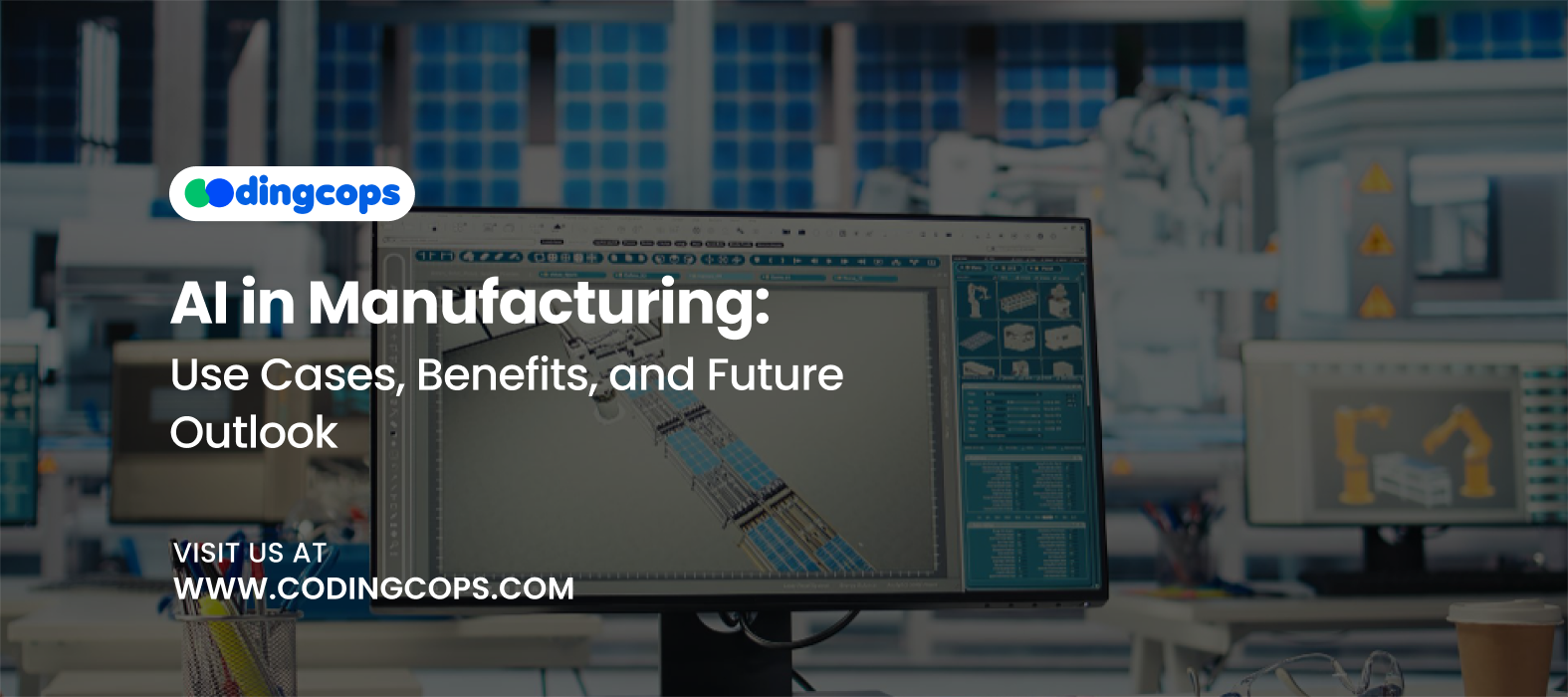We are tired of mentioning again and again that artificial intelligence is revolutionizing every industry. But what else can we even do?
From healthcare applications to financial systems, geology to cybersecurity, artificial intelligence is everywhere. Autonomous vehicles have taken the place of traditional vehicles, businesses have incorporated AI systems to automate their repetitive tasks, and e-commerce platforms have integrated AI chatbots to facilitate their users. In short, every corner of the earth is filled with AI.
As all businesses adopt AI, why should the manufacturing industry lag?
The capacity of AI to automate processes, improve decision-making, and make predictions with high accuracy has flipped the industry of manufacturing. It is currently transforming the ways in which the products are designed, manufactured, and supported.
Artificial intelligence is significant in terms of managing the problems that manufacturers have to solve, including optimizing costs, efficiency, and quality. Therefore, this article discusses how artificial intelligence is transforming the manufacturing industry. Stay with us and learn in-depth about the role of AI in manufacturing.
Role of AI in Manufacturing
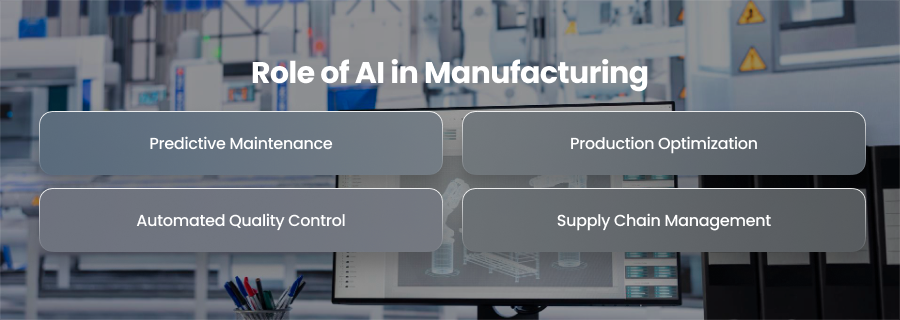
The manufacturing industry is an ideal environment for deploying AI systems and utilizing their full potential. AI integrates with many modern technologies such as robotics, IoT, and cloud computing.
According to a report by Grand View Research, the role of AI in manufacturing is valued at $5.3 billion in 2024 and is projected to grow significantly, reaching over $30 billion by 2030.
Let’s have a look at some practical applications of AI in the manufacturing industry:
Predictive Maintenance
AI systems are widely used to detect signs of a breakdown in advance by using IoT sensors and sophisticated analysis algorithms. This helps you prevent failure or breakdown of your systems before it occurs.
Production Optimization
Real-time adjustment of production parameters to minimize wastage and maximize output can be carried out with AI algorithms. In addition, it maximizes throughput by identifying and optimizing issues. This, therefore, increases efficiency, shortens lead times, and improves profitability.
Automated Quality Control
With AI systems in manufacturing industries, you enjoy automated quality control. This happens by integrating AI tools, such as computer vision, to identify defects with an accuracy far better than the human eye.
Supply Chain Management
Lastly, AI plays a vital role in supply chain management, which is a crucial part of the manufacturing industry. AI systems have the potential to optimize inventory management, understand demand fluctuations, and reduce delivery times.
Why AI is Used in the Manufacturing Industry
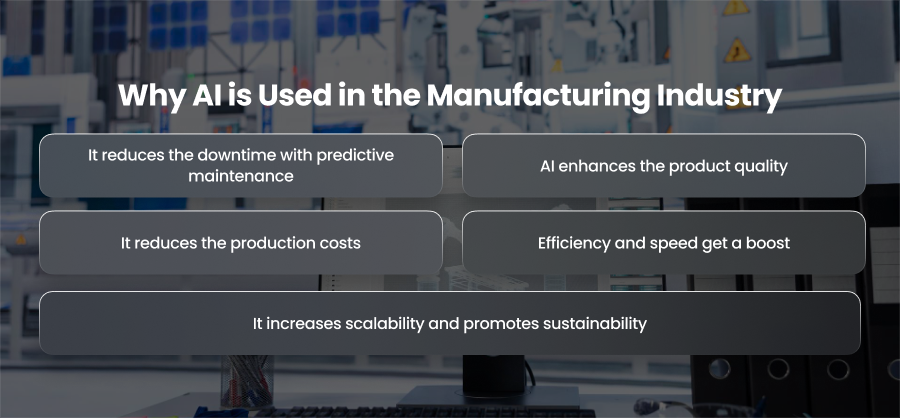
Let’s find out the perks of incorporating artificial intelligence in the manufacturing industry.
It reduces the downtime with predictive maintenance
Firstly, AI empowers your machinery in the manufacturing plant to be vigilant enough to monitor and detect threats before something breaks down. This means you are meant to get the minimum surprises, less downtime, and smoother operations.
AI enhances the product quality
Secondly, industries commonly use AI-powered cameras and machinery that are capable of detecting tiny errors and defects that a human eye often neglects. Thus, it gives consistently high-quality products with less garbage.
It reduces the production costs
The third biggest benefit of AI in manufacturing is automation. AI tools automate the routine tasks in the manufacturing sector, leading to optimized energy usage and less material wastage. Hence, AI helps you save money, which can be used in other processes.
Efficiency and speed get a boost
Further, bringing in artificial intelligence in manufacturing processes lets you plan, schedule, and even make decisions in real-time. This assists in production lines to run faster and smoother without any delays.
It increases scalability and promotes sustainability
Scalability and sustainability are not an issue when you integrate AI tools in your manufacturing infrastructure. Once AI systems are in place, adding shifts or product lines is easier and smoother. Moreover, AI enables you to track and optimize energy consumption, reduce material wastage, and support the recycling process.
Top Use Cases of AI in Manufacturing
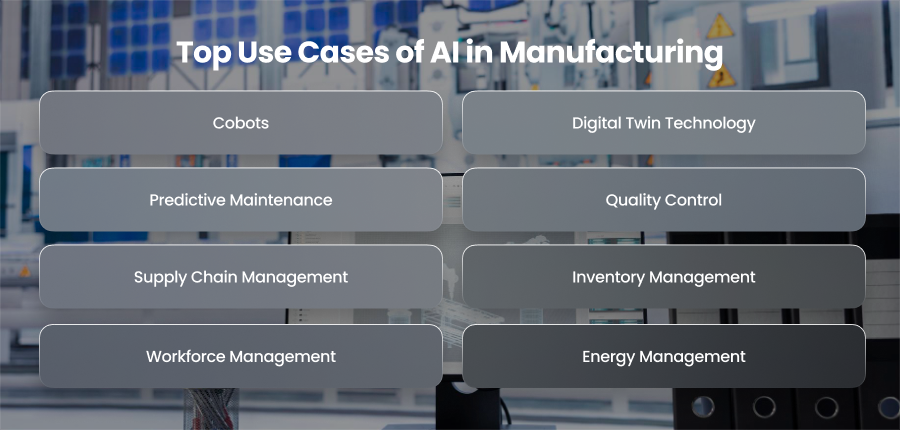
To understand the role of AI deeply, we need to go through AI’s current position in the manufacturing industry. This will be possible by analyzing the real-time use cases of industries using artificial intelligence in their manufacturing pipelines.
Cobots
Cobots is the short form of collaborative robots. These robots are specifically designed to assist human workers. With cobots, productivity and safety are increased, and managing repetitive tasks or physically demanding tasks is no longer a hassle.
Digital Twin Technology
The development of a virtual representation of different physical objects or systems has become the norm. This technology applies real-time data to reflect the precise behavior and performance of the provided system. The technology is very common in manufacturing sectors to develop virtual copies of different processes, production lines, and supply chains.
This type of digital twin can simulate, analyse, and predict real-time performance. In addition, it enables manufacturers to track and streamline operations without human interaction.
The digital twin technology acquires data based on Internet of Things sensors, programmable logic controllers, and deep learning algorithms. Moreover, the technology continuously feeds the models with live data, resulting in the correct and timely visualization.
Predictive Maintenance
AI utilizes sensor data from machines to predict breakdowns before they occur. These systems can flag operators of a possible threat or problem earlier. Moreover, industries can use digital twin technology to evaluate trends and performance of the equipment, which leads to the prevention of failures.
For instance, the automobile industries utilize predictive maintenance in its assembly-line robots. This greatly reduces the surprising downtimes and ultimately saves huge amounts of money.
With this method, manufacturing industries have the opportunity to carry out their maintenance processes in nonpeak hours, leading to minimal disruption to the production pipeline.
Quality Control
Artificial intelligence in manufacturing can ensure quality by bringing in AI-powered computer vision systems. These systems are capable of detecting faults and anomalies beforehand, ensuring that the product quality standards are met. Moreover, this reduces waste and improves product quality.
Supply Chain Management
AI is used in the manufacturing sector to optimize supply chain activities. This achieves it through analyzing large data to forecast demand, to optimize inventory, and to take logistics activities to a new level. Together with a digital twin, AI will enable them to make a living copy of the entire block of the supply chain. This allows the manufacturers to forecast and pre-simulate disruption, delays, or material shortages in real-time.
Moreover, the ML algorithms are in demand for planning and automation of the procurement processes of key resources, ensuring that they are available as soon as they are required. Besides, AI-enhanced order management systems will allow tracking, correcting, and optimizing supply chains, leading to quicker and accurate orders.
Inventory Management
Another use case where AI is used is inventory management. With AI, industries optimize inventory levels by analyzing data to predict stock needs and automate replenishment. AI enables forecasting demand and monitoring inventory in real-time. Thus, manufacturers don’t face any headache in maintaining optimal stock levels, reducing carrying costs, and enhancing cash flow.
Energy Management
The AI systems can track the use of energy in real-time to detect inefficiencies. Such systems can prescribe a change that will not only save energy but also save the environment. Electronics manufacturers are an example of using energy management AI solutions in the optimization of their operations. Such efficiency translates to huge savings and reduced carbon footprints.
Workforce Management
Workforce management is an issue that many companies face. To eradicate this, AI comes to the aid. AI helps in workforce planning and management by scrutinizing the employee data, which leads to shift optimization and enhanced productivity.
Moreover, such systems have the ability to assess the workload on employees, evaluate performance, and create schedules.
Using these AI systems, manufacturers can manage their workforce effectively and efficiently.
Challenges of Using AI in Manufacturing
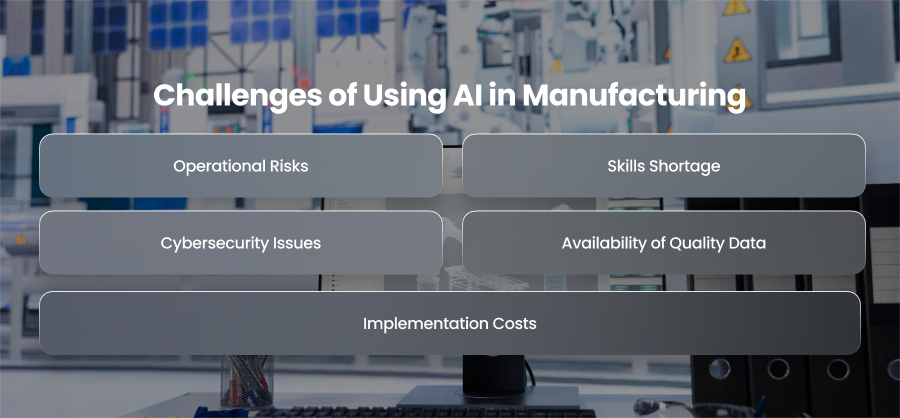
Other than the perks, some challenges also exist that you might face while implementing or using AI in the manufacturing industry.
Operational Risks
The production process is highly accurate and reliable; however, some AI models, such as Generative AI, are not yet fully developed. The existing models may not be precise enough for production settings.
Skills Shortage
Another problem is that there is a lack of professionals with knowledge in AI, data science, and machine learning. This scarcity also poses a dilemma for companies in realizing the full utilization of AI without incurring costs on workforce development.
Cybersecurity Issues
Artificial intelligence will make the world a better place and more connected to the digital landscape, creating more room for cyberattacks. Cybersecurity of sensitive systems requires sophisticated measures by manufacturers.
Availability of Quality Data
AI models demand high-quality data to work efficiently. In the case of the manufacturing industry, manufacturers lack data or quality data, which is extremely important for reliable insights. Hence, such things impact the performance of the AI model, and you can’t get what you aim for.
Implementation Costs
Lastly, the implementation costs of AI models in the manufacturing industry pipelines can be expensive. It requires a large investment in technology and infrastructure, which can be an obstacle in your way.
Best Practices for Adopting AI in Manufacturing
So, if you are a manufacturer or work in the manufacturing industry and plan to bring in AI in the manufacturing processes, you need to consider the following points.
- Always initiate with a small project. Like, if you want to implement predictive maintenance, implement it on one machine first.
- During implementation, ensure that your data is ready, clean, labeled, and integrable.
- Train your employees so they get familiar with AI processes, data analytics, and AI tools.
- Regularly monitor the performance and fine-tune your AI models.
In the End
As we conclude, this must be clear to your brains that no industry in the world is free from the impact of artificial intelligence. It is bringing rapid changes to all environments and assisting humans in doing various tasks easily. Hence, integrating AI in the manufacturing industry is also an example of AI’s power and how it transforms the designing, production, and delivery of products to customers.

